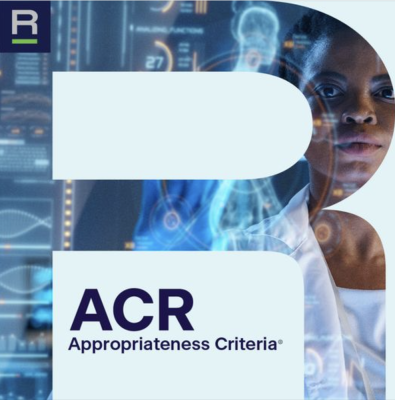
The American College of Radiology (ACR) has released an update to its ACR Appropriateness Criteria (ACR AC) which includes 239 diagnostic imaging and interventional radiology topics with more than 1,200 clinical variants covering 3,900 clinical scenarios. The update includes six new and six revised topics, according to an update from ACR, which is holding its ACR Annual Meeting April 11-14 in Washington, DC. Image courtesy: ACR
April 15, 2023 — The American College of Radiology (ACR) released an update to its ACR Appropriateness Criteria (ACR AC) just ahead of the American College of Radiology Annual Meeting, ACR 2024, being held April 13-17 in Washington, DC. The update, according to the April 9 written statement, includes 239 diagnostic imaging and interventional radiology topics with more than 1,200 clinical variants covering 3,900 clinical scenarios. The update includes six new and six revised topics. All topics include a narrative, evidence table and a literature search summary.
“Several important updates to the ACR Appropriateness Criteria in this release should help referring physicians and other providers enhance the quality of care for their patients,” said Mark E. Lockhart, MD, MPH, University of Alabama Birmingham (UAB) Chair/APT Committee Professor, who serves as Chair of the ACR Committee on Appropriateness Criteria.
New Topics:
1. Acute Elbow and Forearm Pain
2. Endometriosis
3. Imaging of Suspected Intracranial Hypotension
4. Penetrating Torso Trauma
5. Thoracic Back Pain
6. Tracheobronchial Disease
Revised Topics:
1. Acute Onset of Scrotal Pain-Without Trauma, Without Antecedent Mass
2. Altered Mental Status, Coma, Delirium, and Psychosis
3. Multiple Gestations
4. Nonvariceal Upper Gastrointestinal Bleeding
5. Pretreatment Staging of Urothelial Cancer
6. Stress (Fatigue/Insufficiency) Fracture, Including Sacrum, Excluding Other Vertebrae
The ACR Appropriateness Criteria (AC) are evidence-based guidelines to assist referring physicians and other providers in making the most appropriate imaging or treatment decision for a specific clinical condition. Employing these guidelines helps providers enhance quality of care and contribute to the most efficacious use of radiology. The ACR AC was first introduced in 1993 by expert panels in diagnostic imaging and interventional radiology.
The guidelines are developed and reviewed annually by expert panels in diagnostic imaging and interventional radiology. Each panel includes leaders in radiology and other specialties. In 2024, there are 239 Diagnostic Imaging and Interventional Radiology topics with over 1,100 variants and for our Diagnostic Imaging topics 3,900 clinical scenarios.
The ACR allows individuals to use the ACR Appropriateness Criteria for research, scientific, and/or informational purposes only. The AC are not intended to be used as coding guidance for radiologic procedures.
More information: www.acr.org


 December 05, 2025
December 05, 2025 









